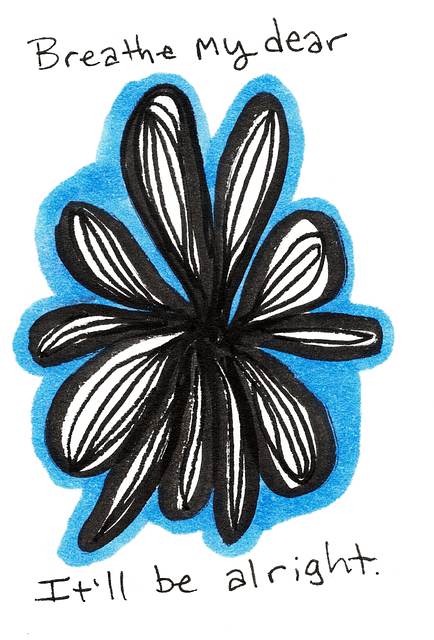Mental wellness apps tailored for adolescent teens (13-19) offer discreet online therapy addressing anxiety, depression, and stress. A strategic approach includes family counseling programs to promote open conversations about mental health, prevent burnout, and foster intergenerational resilience. Targeting keywords like "Therapy for Adolescent Teens" and "Family Counseling" differentiates your app, meeting a growing demand for accessible, non-stigmatizing resources to support teens' mental wellness and build healthier families.
In today’s digital age, mental wellness apps offer a crucial resource for adolescent teens and their families seeking support. This article guides you through developing an effective marketing strategy, from understanding your target audience—adolescents and their families in need of therapy for teenage stress—to crafting a unique value proposition emphasizing the accessibility and convenience of your app over traditional therapy and other digital counseling platforms. We explore powerful marketing channels, including social media, influencer partnerships, content marketing, online forums, workshops, events, and collaborations with educational institutions.
- Understanding Your Target Audience: Teens and Families in Need
- – Market research for adolescent teens and their families seeking mental wellness support
- – Identifying pain points, challenges, and current solutions they use
Understanding Your Target Audience: Teens and Families in Need

In today’s digital age, mental wellness apps have emerged as powerful tools to support teens and families navigating challenging times. Understanding your target audience is paramount when developing a marketing strategy for such services. Teens experiencing anxiety, depression, or stress often seek solutions online, making digital platforms ideal for reaching them. Many turn to their smartphones for instant relief and discreet support, especially when facing sensitive mental health issues. By catering to this demographic, apps can offer therapy for adolescent teens tailored to their needs, ensuring effective communication and a user-friendly interface.
Targeting not just teens but also families in need is strategic. Family counseling and mental wellness coaching programs development can address intergenerational issues and create a supportive environment. Burnout prevention, stress management techniques, and promoting open conversations about mental health within the family unit are essential aspects to highlight. This inclusive approach ensures that apps cater to a broader audience, fostering better overall mental wellness.
– Market research for adolescent teens and their families seeking mental wellness support

The digital landscape offers a promising arena for reaching adolescent teens and their families in need of mental wellness support. Market research reveals a growing demand for accessible, non-stigmatizing resources that cater to both teens experiencing emotional struggles and their supportive family networks. With many teens comfortable navigating online platforms, a well-crafted marketing strategy focusing on digital channels can effectively introduce them to therapeutic solutions.
Targeting keywords like “Therapy for Adolescent Teens” and “Family Counseling” are essential to gaining visibility among search engines. Furthermore, addressing specific concerns such as “Self-Esteem Improvement” and integrating strategies for “Burnout Prevention Strategies for Healthcare Providers” can differentiate your app from competitors. By presenting valuable content that resonates with these keywords, the app can establish itself as a trusted resource for managing mood and promoting overall mental health within families.
– Identifying pain points, challenges, and current solutions they use

Many adolescent teens struggle with mental health issues, often facing challenges that can be overwhelming and confusing. Identifying pain points early is crucial to developing effective coping strategies. Common struggles include anxiety, depression, and stress, which may manifest due to academic pressures, peer relationships, or family dynamics. Currently, many teens and their families rely on traditional therapy sessions, either through individual counseling or family counseling, as a primary means of support. However, there’s a growing need for accessible and engaging solutions that cater specifically to the young mind.
In addition to professional therapy, self-care practices and stress management workshops are gaining traction as complementary tools. Encouraging teens to develop healthy habits, such as structured self-care routines, can empower them to take charge of their mental wellness. Mind over matter principles, when instilled at a young age, offer valuable frameworks for navigating life’s challenges. By combining these approaches, we can create a holistic ecosystem that supports not only adolescent teens but also fosters resilience and well-being across generations.
In developing a marketing strategy for mental wellness apps tailored to teens and their families, understanding the unique needs of this demographic is key. Through comprehensive market research, it’s evident that adolescents and their families often turn to therapy and family counseling as primary solutions for addressing mental health challenges. By leveraging this knowledge, app developers can create targeted campaigns that emphasize the accessibility, effectiveness, and discrete nature of digital therapy options. With a focus on reaching underserved communities, this strategy aims to make mental wellness support more accessible and acceptable, ultimately fostering healthier minds in today’s digital age.









